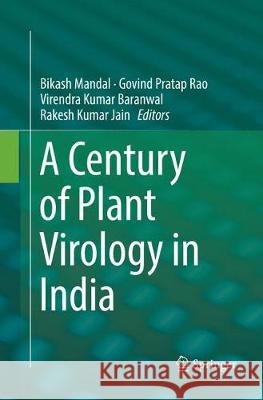A Century of Plant Virology in India » książka



A Century of Plant Virology in India
ISBN-13: 9789811354595 / Angielski / Miękka / 2018 / 805 str.
A Century of Plant Virology in India
ISBN-13: 9789811354595 / Angielski / Miękka / 2018 / 805 str.
(netto: 766,76 VAT: 5%)
Najniższa cena z 30 dni: 771,08
ok. 22 dni roboczych.
Darmowa dostawa!
Chapter 1. Introduction.- Part 1. Virus Characterisation.- Chapter 2. Ampeloviruses associated with grapevine leafroll disease: a new group of viruses in India.- Chapter 3. Biology and molecular biology of babuviruses occurring in India.- Chapter 4. Emergence and diversity of badnaviruses in India.- Chapter 5. Begomoviruses and their satellites occurring in India: Distribution, diversity and pathogenesis.- Chapter 6. Characterisation of carlaviruses occurring in India.- Chapter 7. The present status of carmoviruses research in India.- Chapter 8. Closterovirus in India: distribution, genomics and genetic diversity of citrus tristeza virus in citrus.- Chapter 9. The progress of research on cucumoviruses in India.- Chapter 10. Pigeonpea sterility mosaic emaraviruses: a journey from a mysterious virus to classic emaraviruses .- Chapter 11. Characterization of ilarviruses in India.- Chapter 12. The current status of luteovirus and polerovirus research in India.- Chapter 13. Characterisation of the macluraviruses occurring in India.- Chapter 14. Mandarivirus and allexivirus in India: an update .- Chapter 15. Diversity and pathogenesis of mastreviruses in India.- Chapter 16. Indian peanut clump virus, a fungal transmitted Pecluvirus infecting both monocotyledonous and dicotyledonous plants in India.- Chapter 17. Potyviruses infecting crop plants in India.- Chapter 18. Structural and functional characterization of sesbania mosaic virus.- Chapter 19. The occurrence, biology and genomic properties of tobamoviruses infecting crop plants in India.- Chapter 20. The occurrence, biology, serology and molecular biology of tospoviruses occurring in Indian agriculture.- Chapter 21. Characteristics of tungrovirus occurring in India.- Chapter 22. Studies on viroids occurring in India.- Part 2. Virus-Vectors.- Chapter 23. Aphids as vectors of the plant viruses in India.- Chapter 24. Thrips as the vectors of tospoviruses in Indian agriculture .- Chapter 25. Indian contribution to whitefly (Bemisia tabaci) research.- Part 3. Virus Diagnosis.- Chapter 26. Application of immuno-diagnosis for plant viruses occurring in India.- Chapter 27. Nucleic-acid based techniques for the fine diagnosis of plant viruses in India.- Part 4. Virus Management.- Chapter 28. Phytoproteins and induced antiviral defence in susceptible plants: the Indian context.- Chapter 29. Management of viral diseases through conventional approaches in India.- Chapter 30. Biosecurity from plant viruses in India.- Chapter 31. Transgenic approaches to combat plant viruses occurring in India.
Dr. Bikash Mandal is a Principal Scientist in the Advanced Centre for Plant Virology, Division of Plant Pathology, Indian Agricultural Research Institute (IARI), New Delhi. His major research areas are molecular characterization of plant viruses, diagnosis and application of plant virus genome as useful genetic resource. Dr. Mandal has a total of 86 peer-reviewed research papers in the national and international journals and two patents. He is a Fellow of Indian Virological Society and Indian Phytopathological Society, National Academy of Biological Science and a member of The National Academy of Sciences, Allahabad, India. He is a member in the Study Group on Nanoviridae of the International Committee on Taxonomy of Viruses. Dr. Mandal is the Editor-in-Chief of “VirusDisease”, an international journal on Virology, which is published through Springer. Dr. Mandal teaches Plant Virology and guides master and PhD students at IARI, New Delhi. His major contribution is in developing technologies for diagnosis of plant viruses that are important in Indian agriculture. During last 23 years, Dr. Mandal characterised as many as 24 different plant viruses belonging to 10 genera and generated genome sequence resources, which were utilised to design molecular tools to generate recombinant antigens and antibodies. Dr. Mandal has developed several prototypes of diagnostic kits. Currently, Dr. Mandal’s Lab has initiated work on developing plant virus genome based expression vector and virus induced gene silencing vector.
The book is a compilation of research work carried out on plant viruses during past 100 years in India. Plant viruses are important constraints in Indian agriculture. Tropical and sub-tropical environments and intensive crop cultivation practices ideally favours perpetuation of numerous plant viruses and their vectors in India, which often cause wide spread crop losses. Of all the plant pathogens, studies of plant viruses have received a special attention as they are difficult to manage. A large body of literature has been published on the plant virus research from India during past 100 years; however the information is so far not available in one place. This book provides comprehensive information on the biology, molecular biology, epidemics, crop losses, diagnosis and management of viruses and viroids occurring in India. Description of properties of the viruses are provided in the chapters comprising of different genera such as Allexivirus, Begomovirus, Babuvirus, Badnavirus, Carlavirus, Carmovirus, Cucumovirus, Closterovirus, Ilavirus, Mandrivirus, Potyvirus, Tospovirus, Tungrovirus and Sobemovirus. Virus-vector research related to aphid, thrips and whitefly is discussed. The work on the management aspects of plant viral diseases has been described with reference to the conventional, antiviral and transgenic approaches. Further, the quarantine mechanism developed in India for the exclusion of viruses and vectors has also been included. The book also provides useful information about the capacity building on the research and education on Plant Virology in India. Overall, the book covers a wide range of accounts of research findings and innovations in Plant Virology in India during past 100 years. The book will be a resourceful reference to the students, scientists, agricultural professionals and policy makers.
1997-2026 DolnySlask.com Agencja Internetowa
KrainaKsiazek.PL - Księgarnia Internetowa









